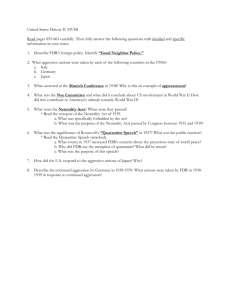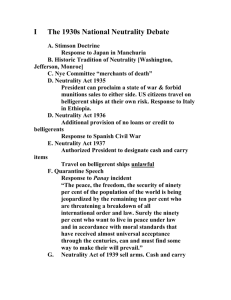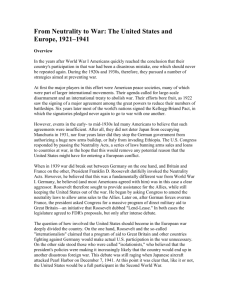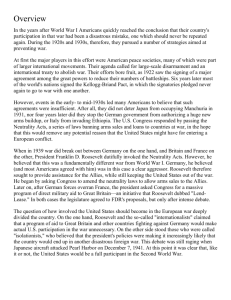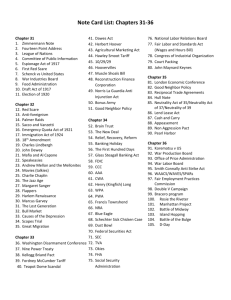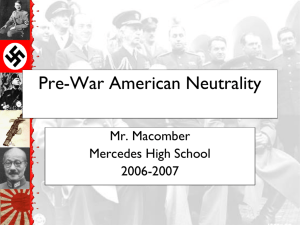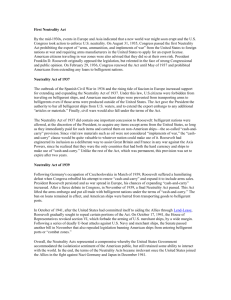File - Ms. Mazzini-Chin
advertisement
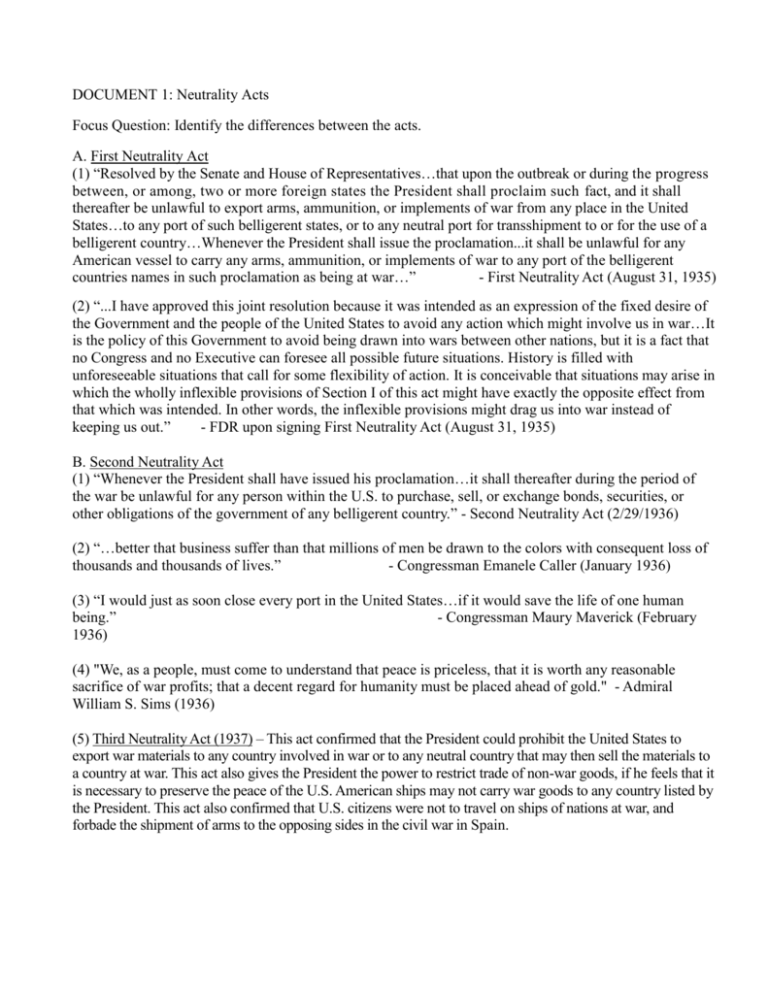
DOCUMENT 1: Neutrality Acts Focus Question: Identify the differences between the acts. A. First Neutrality Act (1) “Resolved by the Senate and House of Representatives…that upon the outbreak or during the progress between, or among, two or more foreign states the President shall proclaim such fact, and it shall thereafter be unlawful to export arms, ammunition, or implements of war from any place in the United States…to any port of such belligerent states, or to any neutral port for transshipment to or for the use of a belligerent country…Whenever the President shall issue the proclamation...it shall be unlawful for any American vessel to carry any arms, ammunition, or implements of war to any port of the belligerent countries names in such proclamation as being at war…” - First Neutrality Act (August 31, 1935) (2) “...I have approved this joint resolution because it was intended as an expression of the fixed desire of the Government and the people of the United States to avoid any action which might involve us in war…It is the policy of this Government to avoid being drawn into wars between other nations, but it is a fact that no Congress and no Executive can foresee all possible future situations. History is filled with unforeseeable situations that call for some flexibility of action. It is conceivable that situations may arise in which the wholly inflexible provisions of Section I of this act might have exactly the opposite effect from that which was intended. In other words, the inflexible provisions might drag us into war instead of keeping us out.” - FDR upon signing First Neutrality Act (August 31, 1935) B. Second Neutrality Act (1) “Whenever the President shall have issued his proclamation…it shall thereafter during the period of the war be unlawful for any person within the U.S. to purchase, sell, or exchange bonds, securities, or other obligations of the government of any belligerent country.” - Second Neutrality Act (2/29/1936) (2) “…better that business suffer than that millions of men be drawn to the colors with consequent loss of thousands and thousands of lives.” - Congressman Emanele Caller (January 1936) (3) “I would just as soon close every port in the United States…if it would save the life of one human being.” - Congressman Maury Maverick (February 1936) (4) "We, as a people, must come to understand that peace is priceless, that it is worth any reasonable sacrifice of war profits; that a decent regard for humanity must be placed ahead of gold." - Admiral William S. Sims (1936) (5) Third Neutrality Act (1937) – This act confirmed that the President could prohibit the United States to export war materials to any country involved in war or to any neutral country that may then sell the materials to a country at war. This act also gives the President the power to restrict trade of non-war goods, if he feels that it is necessary to preserve the peace of the U.S. American ships may not carry war goods to any country listed by the President. This act also confirmed that U.S. citizens were not to travel on ships of nations at war, and forbade the shipment of arms to the opposing sides in the civil war in Spain. FDR's Quarantine Speech “Innocent peoples are being cruelly sacrificed to a greed for power and supremacy…Let no one imagine that America will escape…There is no escape through mere isolation or neutrality…War is a contagion, whether it be declared or not. It seems unfortunately true that the epidemic of lawlessness is spreading. When an epidemic of physical disease starts to spread, the community joins in a quarantine (isolation) of the patients in order to protect the health of the community against the spread of the disease. I call today for a similar quarantine. A quarantine of the lawless, a quarantine of those that threaten world peace.” - President Franklin Delano Roosevelt (October 5, 1937) E. Debate Over Neutrality (1) “The United States has lost its leadership in world affairs. The main reason for this loss of influence is plain; treaty breaking governments and dictators have become convinced that for no cause short of actual invasion will the United States initiate or join in any effective movement to assure world peace. For this conviction on the part of these treaty breakers the 'isolationists' and 'pacifists' in Congress… are chiefly responsible. These groups include persons who believe that we can stay out of any world conflict. They attribute our entrance into the last international war to British propaganda and the scheme of bankers to enrich themselves. ...The world was put on notice that the United States was out to save its own skin from immediate dangers; and the dictators were informed that the American group controlling policy was prepared to see the world remade on fascist lines without interference and apparently without understanding that this would mean anything dangerous to us at all." - Editorial in The New York Times (November 30, 1937) (2) “At the very least, we can and should avoid any action, or any lack of action, which will encourage, assist or build up an aggressor. We have learned that when we deliberately try to legislate neutrality, our neutrality laws may operate unevenly and unfairly – may actually give aid to an aggressor and deny it to the victim. The instinct of self-preservation should warn us that we ought not to let that happen any more.” - President Roosevelt, Annual Message to Congress (January 4, 1939) (3) “I regret that the Congress passed that Act [First Neutrality Act]. I regret equally that I signed that Act. On July 14th of this year, I asked the Congress, in the cause of peace and in the interest of real American neutrality and security, to take action to change that Act. I now ask again that such action be taken in respect to that part of the Act which is wholly inconsistent with, ancient precepts of the law of nations – the [arms] embargo provisions. I ask it because they are, in my opinion, most vitally dangerous to American neutrality, American security, and American peace.” - President Roosevelt (September 21, 1939) (4) “If we repeal (take back) the neutrality laws, then we are forgetting the decisions that Congress had made twice since 1935. We may not realize it, but we are considering a change because we want to help nations with whom we agree, and we want to hurt nations that we believe are aggressive. In my opinion, this is the road that will lead us to war, and I will not take it…The people who want the change say that we are doing it to stay out of the war. But their reasons for wanting the change are obvious, and it will look like we have taken sides. Once we have taken sides, someone is going to be disappointed, so this decision is dangerous.” - Senator Vandenberg, adapted from speech (Oct. 4, 1939) F. Neutrality Act of 1939 This act slightly changed the terms of the Act of 1937, and effectively ended the arms embargo. Under this act, it was still illegal for U.S. ships to bring war goods to countries involved in conflict, but it has allowed foreign countries (even those at war) to buy U.S. goods and transport them in their own country’s ships from the United States. This was known as “Cash and Carry.” The vote was 55 to 24 in the Senate, 243 to 172 in the House. G. Comparison Chart In the chart below fill out the top three reasons for the U.S. to stay neutral, and the top three reasons why we should not stay neutral. You may think about WWI policies while you come up with your reasoning…

